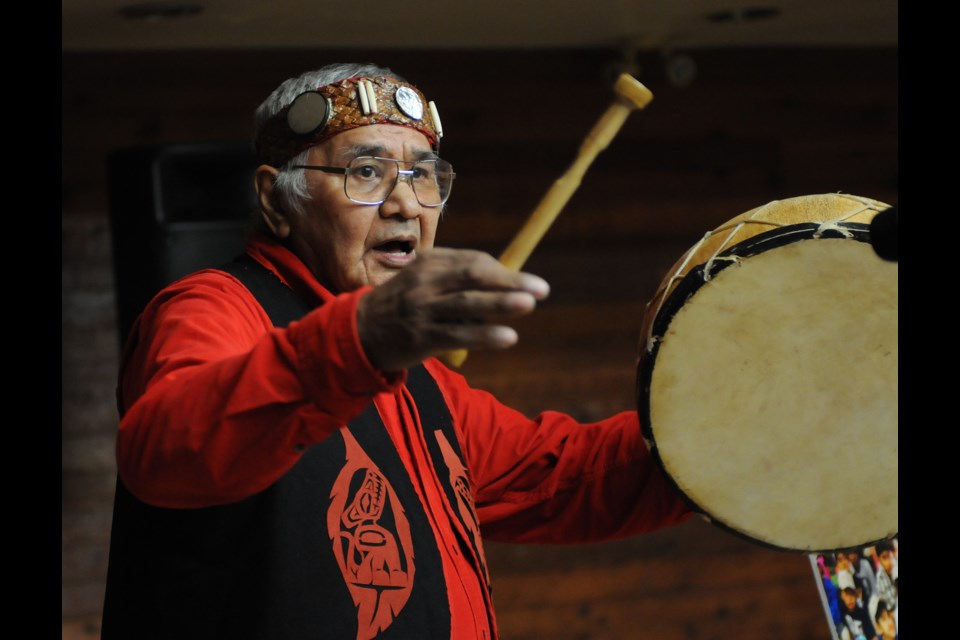While serving with the Royal Air Force during the Second World War, air gunner Ernest “Peter” Bone trained in Winnipeg, but says his mind was never far from his family in London living through what has since become known as the “Blitz,” — sustained strategic bombing of Britain by Nazi Germany.
Speaking to a large crowd gathered at the Vancouver Aboriginal Friendship Centre on Hastings Street Feb. 3, Bone spoke not only about his time during the war, but also of his work visiting schools as a long-time volunteer with the Memory Project Speakers Bureau. The Memory Project, an initiative of Historica Canada, gives veterans and serving members of the Canadian Armed Forces an opportunity to share their stories of military service through its online archive and volunteer speakers bureau. Bone, who has shared his stories with students at more than 45 schools, was honoured with an award at the event last week in recognition of his volunteer service to the project.
The project also collects stories and photos and posts them on its website.
Bone said after speaking at numerous elementary schools over the years, he reached out to every secondary school in Vancouver last year.
“And all but three responded immediately,” said Bone, who noted he initially thought 2014 might be his last year to take part in the Memory Project due to concerns around mobility.
On the Memory Project webpage dedicated to Bone, he writes in part, “I feel honestly that sometimes the only way to overcome a great evil is to resort to a lesser evil. There is no black or white in war, only gradations with much grey in between. There isn’t a simple matter of idealism; there’s no morality in war. It’s useless and stupid to look for morality in war because war isn’t moral. War is evil and killing people is evil. But there are times when it has to be done and Britain and the allies, or Britain particularly under Churchill [Winston Churchill, prime minister of Britain] wasn’t prepared to take that awful risk to adhere to the Geneva Convention…”
Last week’s ceremony opened with a blessing by elder Joe Calder of Nisga’a Nation, who sang and drummed, followed by personal notes of thanks read out by students from Sir Wilfred Laurier elementary. Following a presentation to Bone from Grade 4 students Casey Schmidt and Sophia Tines, Roshin Sandhu told the Courier he wasn’t aware of too many details of the Second World War before Bone visited his school. Roshin said his favourite part of Bone’s talk was related to the death of Adolf Hitler, leader of Nazi Germany. Bone told the crowd that when he speaks to students he likens Hitler’s behaviour to that of a “grown up” schoolyard bully.
“I like how he tells the story of the war,” Roshin said. “And the part when Hitler dies.”
At last week’s ceremony, 31 veterans of conflicts ranging from the Second World War to the war in Afghanistan received certificates of achievement recognizing their commitment to educating younger generations about the sacrifices experienced by Canada’s men and women in uniform and their contributions to this country’s history. Students from both Sir Wilfred Laurier elementary and Ideal Mini School attended the ceremony.
One veteran watching with interest was Annie “Mary” Hokonson, who sported an army cap and chest full of medals representing her time served in the Second World War during which she served in Canada, Holland and Germany. Hokonson joined the Canadian Women’s Army Corps in 1942, and while she started her army career as a waitress in the officer’s mess in Vancouver Barracks, she ended it serving overseas in Holland and Germany. On the Memory Project’s website, Hokonson writes about boarding a ship in Halifax, which took three weeks to get to England.
“We were evidently the first troop ship to go through the English Channel and we docked in London, which was being bombed at the time, and I thought to myself after spending 21 days on that water, I don’t want it to be bombed before I get off this ship,” Hokonson wrote in part.
“So it was quite a relief to get on a train and head for Aldershot, where we were stationed until we got our postings to various companies in England, and I was sent to London to 50 Company.”
Senior project manager Jill Paterson said the organization seeks to offer representation from all Canadian tours and conflicts to ensure the next generation of young Canadians can continue to learn about this country’s military history. To that end, the Memory Project is actively recruiting Canadian Forces personnel still serving and veterans to join their community of volunteers. Visit thememoryproject.com for more information.
Memory Project thanks veterans
- More than 30 veterans received certificates of appreciation from the Memory Project Feb. 3 at a special ceremony held at the Aboriginal Friendship Centre on Hastings Street, including Ernest “Peter” Bone, Michael Harvey, Poldi Meindl, George McLean, Shirley Ridalls, Paul Richards, Svend Hansen, Gordon Mumford, Ann Styles, Orme Payne, Dennis Kirkpatrick-Crockett, Jim Harris, Margaret McKay, Jack Purdie, Keith Lang, Helmut Lemke, Boyd Affleck, William Booth, Frank Leighton, Art Lang, Ernie Poignant, Karl Charest, Bill Cameron, George Anderson, Margaret Kury, Noel Butcher, Jean Hubbard, Bonna Young and John Lees.
twitter.com/sthomas10



